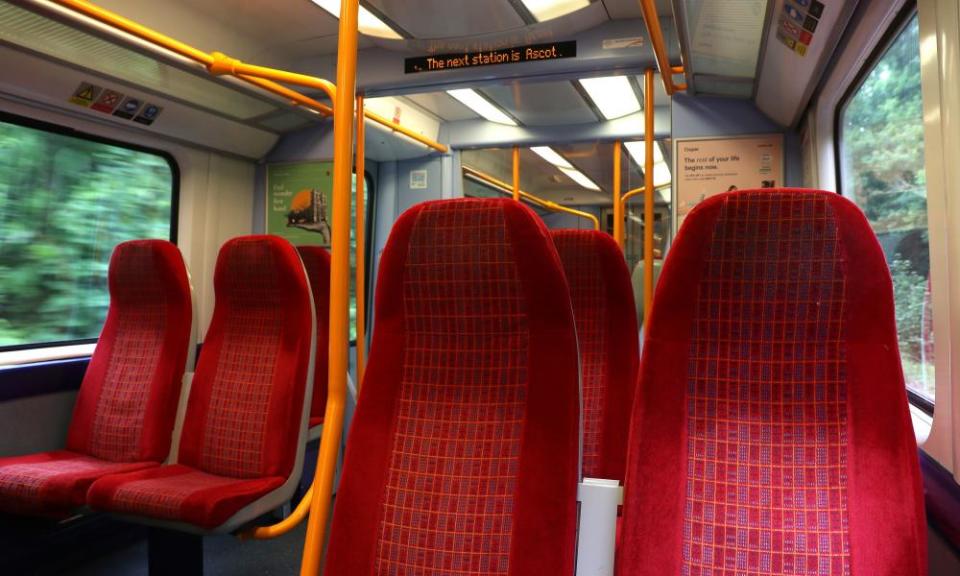How part-time commuters can save money on peak-time rail travel

When offices all reopen there is a good chance that many workers will still spend at least some of their week at a desk at home – whether through choice or because their employers do not have room for everyone to be in at once.
But for those who take the train, a part-time commute can be the worst of both worlds: they face the choice of buying pricey daily tickets for rush-hour travel or paying for an annual season ticket they will use for only half the week.
Under existing ticketing schemes, paying daily to travel into a city centre can be hugely expensive.
Take, for example, the busy Reading to London Paddington route. An annual season ticket is £4,736, rising to £5,620 if you want to include onward travel within London zones 1-6.
However, if you buy a return ticket on the day, it is £51.80, assuming rush-hour travel. Do that twice a week, 46 weeks a year, and the cost will be £4,765 – even more than the full season ticket. Do it three times a week and it’s a colossal £7,148.
When Guardian Money checked other routes, it was almost always more expensive to buy tickets for three days a week than it was to buy a full annual season ticket. For example, Tunbridge Wells to London Cannon Street is £5,492 if bought daily three times a week but £4,928 for a season ticket. York to Leeds is £2,580 buying daily three times a week, against £1,960 for a season ticket. And while it is always sensible to book long-distance travel in advance to get bargains, booking ahead on peak-time commuter routes rarely earns you a discount.
Anthony Smith of the passenger body Transport Focus has already raised the alarm. He says: “People working from home for two to three days a week will not want to pay for a traditional season ticket offer but will still expect some recognition that they are a regular, if less frequent, traveller.”
Train companies are seeking DfT approval for a number of new, cheaper, flexible and part-time season tickets
A pilot scheme to offer part-time season tickets earlier this year was abandoned when coronavirus struck. Now, because these are regulated fares, the train companies are seeking Department for Transport approval for new, cheaper, flexible and part-time season tickets.
Great Western Railway – which runs lines into London Paddington – is understood to be seeking to offer a part-time season ticket that will be usable for three days out of seven, as well as selling packs of 12 tickets that could be used over a month, during rush-hour travel.
However, the level of savings these options would offer part-time commuters has not been disclosed. Nor is there any timetable for when these tickets will become available.
A DfT spokesperson confirmed it was examining options such as carnets – where you buy a pack of five, 10 or even 50 tickets at a discounted price, and they generally expire after one to three months. “We are working at pace with industry to examine how we can help make sure part-time and flexible commuters are provided with better value and more convenient options … we are considering how we can make progress as quickly as possible.”
So what can you do now if you only want to go into the office occasionally and want the best fares?
Carnet tickets

There is a hotch-potch of schemes around the country where travellers can buy a discounted batch of carnet tickets that can be used between two named stations at any time. They usually come in five, 10 or 12 and are valid for one to three months, although sometimes longer. They typically work out at 5% to 10% cheaper than buying on the day.
• Thameslink was among the pioneers of carnet tickets. It offers carnet 5 and carnet 10 tickets that are valid for three months only, and are only available for travel to and from 17 of its stations. The saving is 10%. For example, a peak-time day return from St Albans to London is £21.90 if bought on the day, which adds up to £109.50 for five return journeys. The carnet for five returns from St Albans costs £98, a saving of £11.50.
• Greater Anglia has replaced its earlier carnet offering with one of the most developed “flexi” schemes. It sells packs of five, 10, 30 and 50 return tickets, with the saving at 5%, 7% or 10% depending on how many you buy. Note that some of these packs have short expiry dates. For example, for Chelmsford into London a standard return is £30.60, while 10 FlexiPass tickets work out at £28.45 each – but must be used within one month of purchase.
• ScotRail has a 10-trip Flexipass, promising savings of “10% or more”, valid for one month. You can also buy a 50-journey Flexipass for travel between Edinburgh and Glasgow.
• South Western Railway offers packs of 10 anytime day return tickets. But the discount is only 5%, you have to take out its Touch Smartcard and you only have two months from the date of purchase to use all the tickets.
• West Midlands Railway offers flexi-travel packs of 10 tickets but the discount is only 5% and they are valid for one month from purchase.
• Northern Rail launched its flexi-season ticket in mid-July, with a 10% discount on peak return fares. You have to download the tickets on to a smartcard. The current peak-time fare for travel from Harrogate to Leeds is £10.40 (anytime day return). With flexi-season, commuters can buy 10 day passes for £93.60. It’s a halfway house between the current weekly return ticket, costing £42.90, and the monthly at £164.80.
But there’s a drawback – Northern says it is only between Harrogate and Leeds and Skipton and Leeds at the moment. A wider rollout is planned, but Transport for the North says it is “seeking approval from the Department for Transport to spend more funds from the ringfenced budget so it can rapidly extend the flexi-seasons initiative across the whole of the north”, but needs funding.
Note that flexi and carnet tickets may only offer real savings on peak-time tickets; if you are travelling off-peak, especially with a railcard, it is cheaper to buy a ticket on the day.
Stagger your journey and arrive after 10am

It is notable that at the same time as the government is suggesting workers return to the office, and the train operators are setting up part-time season tickets, we are told not to crowd on to public transport. There are calls to stagger journeys – and if you do, starting later and finishing later can save you money.
In general, commuter trains that arrive at London terminals after 10am are cheaper than peak-time trains, sometimes substantially so.
For the high-speed 38-minute journey from Ashford in Kent to St Pancras in London, for example, there is a £73.10 day return at peak time, dropping to £34.30 if you arrive after 10am. Going in earlier – catching, say, the 6.16am train – does not earn you any discount.
Look out for quirky local deals

Some local initiatives offer massive discounts – if you know about them. For example, the standard peak-time return from Gunnislake into Plymouth, a 45-minute journey, is £9.60. OK, it’s perhaps not Britain’s busiest commuter route. But if you pop into Pearces petrol station in the village, they will sell you 10 tickets for £29. Further down the valley, at Margaret’s Hairdressing in Bere Ferrers, you will get 10 tickets from the local station into Plymouth for £23. It’s an initiative by the Devon and Cornwall Rail Partnership and you have to use local shops to buy the tickets, not the National Rail Enquiries service.

